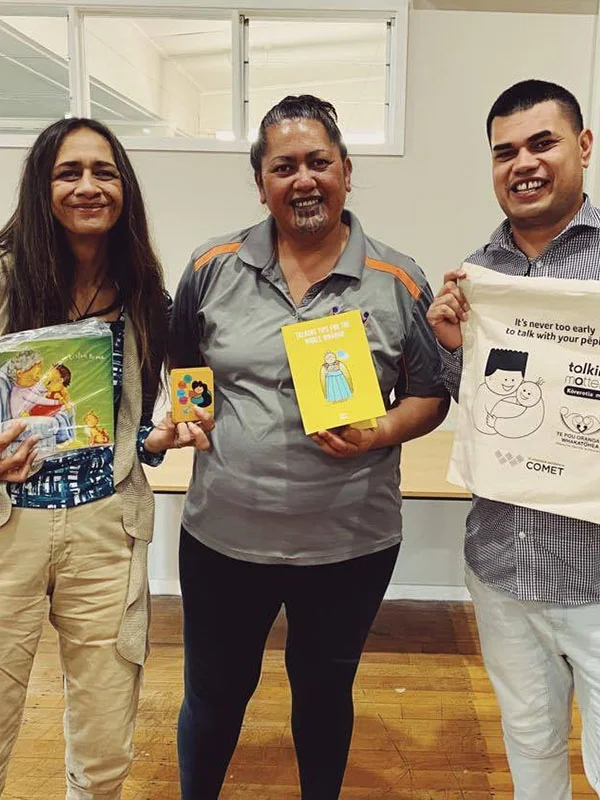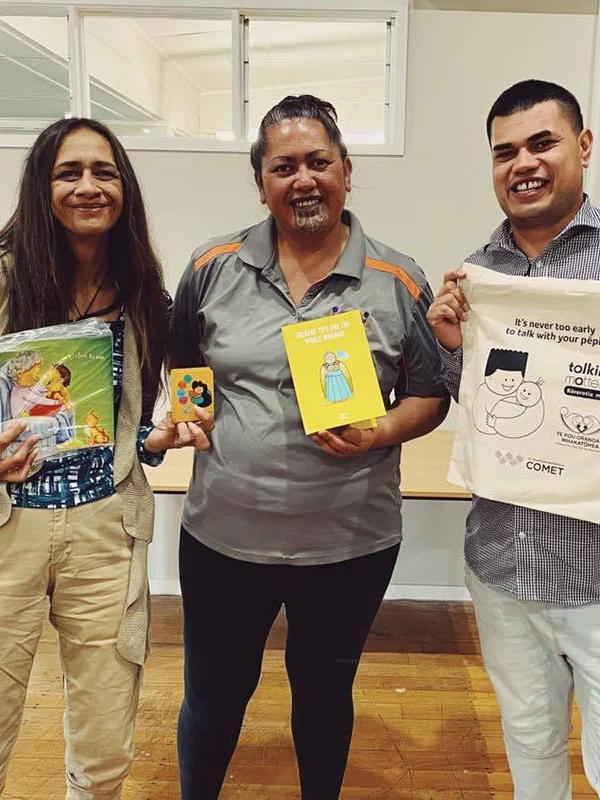
Building young brains 'a super power'

11 April 2023
Pēpi are wired to learn language in their first 1,000 days, more than at any other time in their life. Talking with pēpi is at the heart of Talking Matters, a kaupapa focused on growing strong communicators through language.
Hana Tuwhare, a community activator in Tāmaki Makaurau, is a trained speech-language therapist who is passionate about revitalising te reo Māori at the beginning of life.
When she works with whānau, Hana takes their dreams and aspirations for te reo and creates a strategy to help them achieve them. She says it’s important to create space for whānau to come together and learn, putting their pēpi at the centre of the language.
For Hana, helping whānau use te reo Māori with their tamariki is magical.
“It’s the kind of job that makes me go, ‘oh I could do this forever!’,” she says.
Hana is one of five community activators across the motu. The roles were created a few years ago when a need was identified to connect with the community from a grassroots level.
It’s about going out and connecting with those who are passionate about the kaupapa, talking to those in organisations who already work with whānau, and finding people who are excited to share language with pēpi.
Hana Tuwhare
Working with community
Community Activator Anthony-Quinn Cowley is a pāpā who had previous involvement in the kaupapa through his own tamariki.
Anthony and his whānau live in Ōpōtiki, and after his pēpi had to undergo a liver transplant, he and his partner were drawn to Talking Matters to engage her in education. Anthony being Māori (Ngāti Tūwharetoa, Ngāti Porou), was interested in teaching her te reo in the first 1,000 days.
Now, his involvement with Talking Matters has come full circle.
“The passion is still there, and that’s the reason why I’m still in the mahi.”
Tampy Bernard has been part of the kaupapa for many years. He was first introduced to Talking Matters soon after he and his partner had their fourth taitamaiti, Hawaiiki.
“The neuroscience really grabbed me, and the culture, and just standing strong in your identity. My wife is Māori and I’m Samoan, so that gave me a new lease on life to speak Samoan to him. It’s amazing how things come full circle,” he says.
Natural Born Einsteins (transcript)
Marcia Ocampo:
Ok, my love.
We are going to make some pies.
Where is your papa?
Your papa is working.
In our house, we speak like three languages. English, of course, because this is the one that everyone speaks here. I speak fluently Spanish and my husband speaks Māori. So we are both talking to her in different languages.
Kia Ora heihei (chicken)
She has a fourth language which is Quechua. That's the native language from my country.
We picked a lemon!
Kōkako will be a Māori and indigenous Peruvian too. Speaking multiple languages will make her clever. She's a good communicator. She's talking now.
Tampy Bernard:
1, 2, 3, 4, 5, 6.
Six stairs!
Would you like to eat some chop suey and rice?
Take your shoes off.
We're a multilingual whānau. We speak three languages predominantly.
Shall I get you a plate?
English, Samoan, Te Reo.
We put our hands together.
(Prayer to bless the food in Samoan.)
It's not confusing speaking three languages to kids. It's actually better for them.
You're a good boy. Let's eat.
Chop suey!
I've come through the programme on Talking Matters as a father participating with my son Hawaiki, four now.
Six, seven.
I learn so much from him [and] he learn so much from me about the power of talk. And from there I'm a community activator now with Talking Matters.
Hey.... give me five!
We knew that talking grows brains in any language. The best for us is for him to stand strong culturally in his identity.
What is its name in te reo Māori?
And if he's walking in three worlds confidently,
kakiroa.
- kakiroa.
Yeah, I think we've set him up for success, actually.
Good boy.
Uira Tāmati:
Look... potatoes.
Tampy Bernard:
At the moment I'm working with a really cool multilingual whānau. I'm teaching them about translanguaging, how to share their culture, just like I did.
Marcia Ocampo:
What do you think, my love?
Tampy Bernard:
Hola familia.
Nau mai, haere mai.
Look at all this communication going on here!
Are you guys ready for a coaching session?
Uira Tāmati:
Always, man.
Tampy Bernard:
Alright, te whānau, I've got your LENA report from the last recording you guys did with the LENA device.
So the LENA device, it's like fitbit. It goes into a little vest that you put on a child. And what's it doing is recording all conversations around the child for the day that it wears it.
So this is our recording number three. Actually, take a look at the adult word count.
Marcia Ocampo:
Oh she's responding.
Uira Tāmati:
Some parts where she's doing more than us.
Marcia Ocampo:
It's really good.
Tampy Bernard:
First one thousand days of life is the most crucial time for learning. We've got brain connection forming at one million connections a second. Everything a baby hears, feels, sees, all those things are bringing meanings and connections to babies and it's actually growing their brain, setting them up for positive interactions, for feeling love, joy, self-regulation.
Marcia Ocampo:
Who's this?
Tampy Bernard:
So I see that conversations start to turn at 11 o'clock.
Marcia Ocampo:
We usually talk around eleven with my parents in Peru.
There's Mama and Papa too.
Tampy Bernard:
I can see that she really is into the conversation. And I see at 4 o'clock, Kōkako's awake. This is Daddy time, eh?
Uira Tāmati:
We go outside and we just play on the trampoline and we just talk.
Tampy Bernard:
She's actually responding more to you outdoors.
Uira Tāmati:
Cause I'm doing a lot of listening and to see her observe, observing her response. When she is responding to three different languages. It doesn't seem possible, but it is possible.
Marcia Ocampo:
It's your name, my love.
Uira Tāmati:
Babies are quite brainy. Natural born Einsteins.
Marcia Ocampo:
Come here my love.
She's sleeping.
Uira Tāmati:
My dream for her is to be able to speak Māori and Spanish. So she can connect with people from Peru and also connect with her people from here and to influence others.
Good night, my love.
Talking Matters is a very inspiring kaupapa. It fills me up with warmth, makes me feel proud that as a father, I'm doing right.
Walking alongside whānau
Coming in on a lived experience, Anthony and Tampy hope to make every whānau feel powerful in their language, strengthening community from the ground up.
“Talking Matters isn’t about being prescriptive, it’s about walking alongside whānau, affirming the efforts they do and helping them see things differently and more often,” Tampy explains.
Passing on the kaupapa and helping to build young brains is what he calls a superpower. With a diverse team from all walks of life, whānau and tamariki are in experienced hands.
Although each brings different skillsets, they all speak the language of community.
Talking Matters is supported through a national partnership with Tākai.













